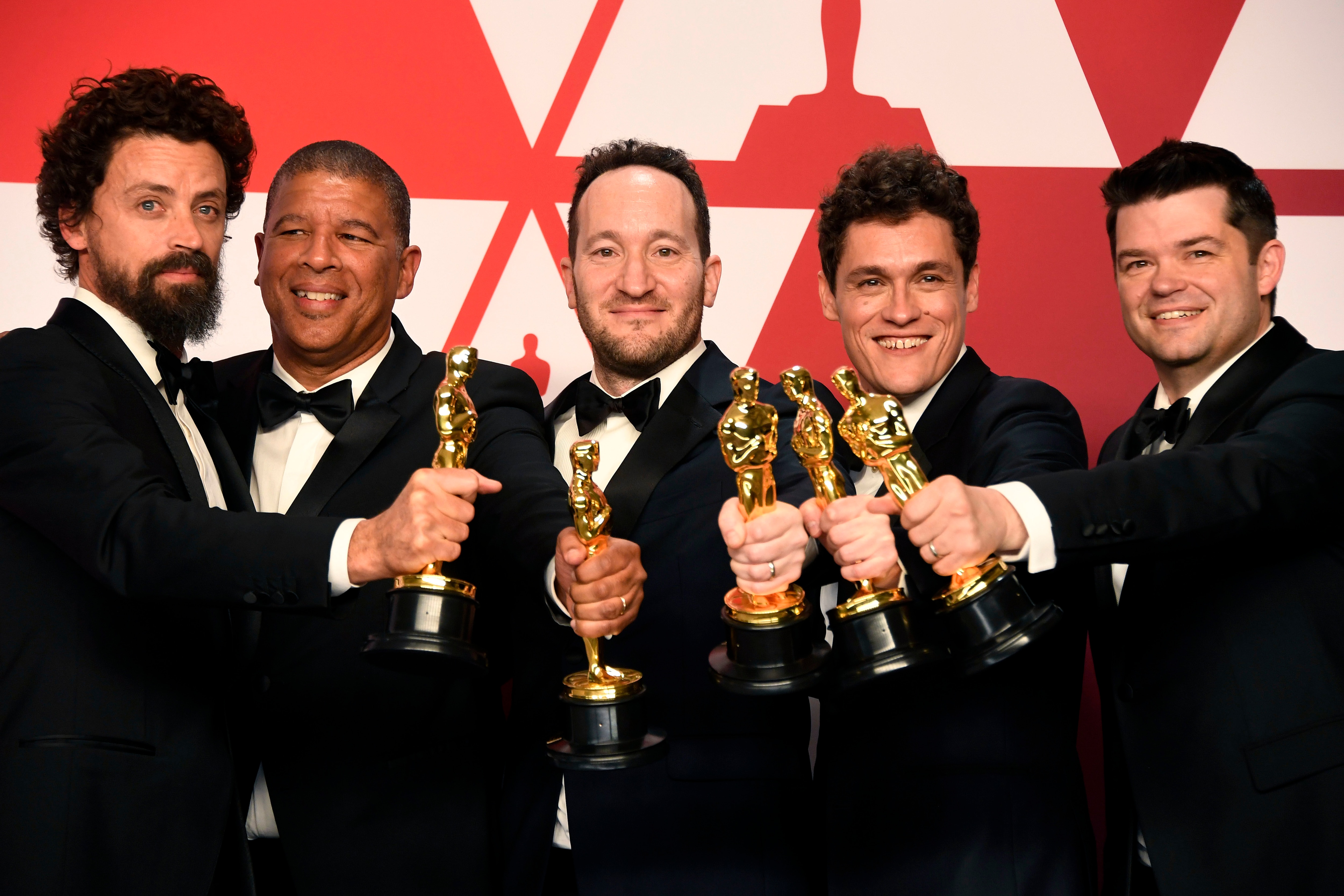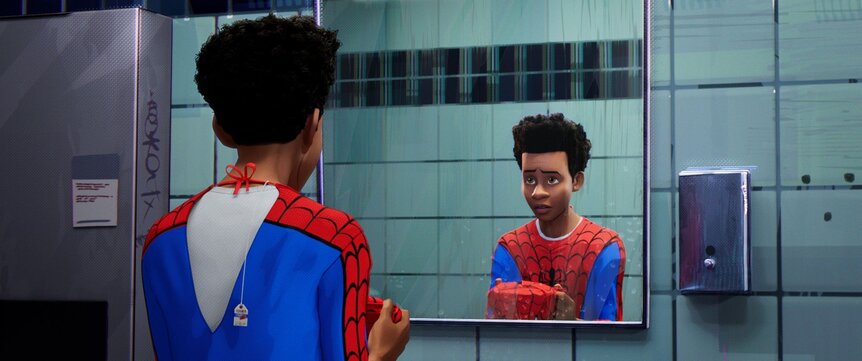Create a free profile to get unlimited access to exclusive videos, sweepstakes, and more!
Spider-Verse director Peter Ramsey reveals how creative pain often leads to better things

Failure. It’s almost a dirty word since humanity continues to herald success, awards, and influence as the true benchmarks of “worthiness” in our lifetimes. However, if you’ve ever succeeded in anything then you know the real truth is that a whole lot of failure comes first to get to the actual end goal.
Hoping to add some of that truth to the narrative of what it takes to achieve, the Million Stories website has created Faceplant, a new video series that features a bunch of “winners” who admit they had to overcome a lot of losing to be where they are today. One of the latest episodes is about Peter Ramsey, the Academy Award-winning co-director of Spider-Man: Into the Spider-Verse.
Ramsey has been toiling in the business for years, first as a storyboard artist for live-action directors such as David Fincher, Barry Sonnenfeld, Ron Howard, and Ang Lee. He then pivoted to animation storyboarding and worked his way up to directing DreamWorks Animation’s Rise of the Guardians and then Spider-Verse for Sony Pictures Animation.
And was it a smooth, meteoric rise to his ultimate goals? Nope.
SYFY WIRE got on the phone with Ramsey to chat about how important it is to be honest about the bumps in the road, what he’s learned from the heartbreaks — including losing beloved sequences in Into the Spider-Verse — and how all of it makes him a more robust creative.
Let’s start with the world of animation, which is notorious for being a medium in which you develop things over a long period — and then the project just dies. You put all of this heart and passion and creativity into a thing, and then it doesn't happen. How do you pick yourself back up and move on to the next thing?
It's funny, with me, I've experienced that phenomenon and it feels like a few different ways. When I was in my early 20s, I was just deciding that I want to work in the film business, thinking, "I think I want to be a director. I'm going to try to do it." And even having a passion for it, you’re realizing, "Oh, it's not as easy. I didn't know that I was going to have to jump through so many hoops." Or, "I didn't know that I was going to have to get past so many gatekeepers." And I didn't know that. So it's adjusting to the reality that nobody is really an overnight success that way. I think that's one of the lessons that I started learning.
At the same time, I was very lucky because I worked pretty diligently early on. People would see that. And I would get positive affirmation, which I always thought of as climbing a mountain. You're there and you've got your little pickaxe, you're looking for the handhold, and you grab onto one that's solid and you pull up: "Oh, look at that! I've got a really nice view and the breeze is coming through, and I've gotten to this level," but you've got to hold on or the wind's going to blow you off. [Laughs.]
And you just start realizing that, it's that a lot of the time. It's not so much about being instantly acclaimed as a success. Once in a while, you get up to a peak and you can enjoy it, but really getting to the top of the mountain, it's a lot of holding on to the side of the mountain and making sure you're not getting blown off. It's a process.
Spider-Man: Into the Spider-Verse is the perfect example of the best-case scenario outcome. But in the Faceplant episode, you are honest about how it was a stressful crunch to land that film. What did you walk away with from that project that either reinforced a specific ethos or helped you look the process anew?
With the Spider-Verse experience, it's something I knew, but the [film] reinforced it times a thousand, which was the importance of having a vision, or a North Star, to guide you through the process. Because any way you do it, it's going to be backbreaking work. But if you don't have a clear goal that you can communicate to everybody working on that movie, it's just going to be that much harder. So that's probably absolute number one.
And then the other thing was about the context and the atmosphere that you're making these things in, the studio or the company that you're making it at, and the people that you're working with. So much of Spider-Verse was the way it was because we were working with people who really did have a true creative vision, and were brave enough and stubborn enough to push against any obstacle to be able to make something really different, and just tenaciously clung to that. So without [executive producers] Phil Lord and Chris Miller, there was just no way. Without their stature in the industry and their ability for Sony to trust them to that degree, to let them pilot it that way, it would never have happened. So there's a lot of things that have to go right for a movie to be that successful.
Every film cuts things that break your creative heart. What was it in Into the Spider-Verse?
Oh yeah. The big one for us was in the original version of the movie, Ganke Lee, Miles' roommate, was a much bigger part of it. The role that Ganke played was a lot more like in the comics, where he is Miles' friend, and they're both discovering Miles' powers as Miles is discovering them. It was much more of a story of these two friends going through this together. We had stuff that was just so charming and funny and fun, so much so, we were like, "Man, he doesn't even need to become Spider-Man!" It was so entertaining to watch Miles and Ganke's interaction. It was fantastic.
But when they started the promos for Spider-Man: Homecoming, they basically kind of took the Ganke character and transposed him into Ned’s role, because they thought Peter Parker needed a best friend. And suddenly it was like we can't use Ganke anymore. We were just devastated. But looking back on it now, I don't know how we could have ever serviced that story properly with the amount of time that we would have had. So in that way, ultimately, it was good for the movie and good for Miles as a character. But wow, it sure didn't feel like it at the time. [Laughs.]
You win the Academy Award this year and now you have a career crossroads: Direct more theatrical animated films or circle back to your origin, live-action. How did you tackle that decision?
I'm always like, "Well, I’ll have some of this and some of that." So I'm still heavily involved in animated projects and the process of making an animated feature, It's grueling and it's long. It's super fun and inspiring too, though. But for me, with live-action, my sensibility has always been that. I think the animated projects that I've been involved with, both Rise of the Guardians and Spider-Verse have had enough of a foot in a live-action cinematic sensibility that I was a good fit for them. There are a ton of other animated movies that I think I'd be useless for because I didn't come up through the pipeline that a lot of animation people come up through, which is, people who've been devoted to animation as a career and a passion their whole lives. And I just didn't have that. I definitely came out of a live-action thing. And whatever I do bring to animation, I think comes out of that sensibility.
So to pivot back to live-action, in a way it's kind of pivoting to something that I don't feel like I ever took my head completely out of. And if I die without having directed one live-action movie, you'll hear my soul screaming for eternity. It'll just feel like I totally failed. It feels like something I have to do. But also I learned so many lessons that are helping me now in thinking about live-action film from what I did in animation. I don't think I would feel as ready as I do now to really do a good movie, had I not had the animation experience.
You are attached to direct Love in Vain about the legendary blues musician Robert Johnson. And you also announced on Twitter you are collaborating with Kubo and the Two Strings creator, Shannon Tindle. How about the Spider-Verse sequel team? Do you consult and talk with them regularly?
Not a lot of stuff has been announced yet but I've still definitely got one of my feet firmly in [the animation] camp. And the [Spider-Verse] team talk all the time. I'm seeing stuff and it's super exciting. I can say that it's in very, very, very good hands.
Last but not least, we’re in a world with a pandemic, huge costs for higher education, and there's a giant recession. But, the arts are getting a lot of us through this common misery. How do you encourage the next generation coming up that may see all those blockades as almost impossible to overcome?
I tell a lot people, a lot of times, [that] I lived through versions of all of that. All of those ways of dissuading somebody from following it as a career, I heard all that stuff. Even when I didn't know exactly what I wanted to do or how I could do it, it was always burning. I'm the kid at the show who's looking at people up on stage and almost hopping out of his chair to get up there, so it was always a desire.
I always tell people, if you have a real passion for it, then don't let it go. Because you're going to find a way, even if it's just to teach yourself the skills that you need. You can storyboard a whole movie on a stack of scrap paper. And I promise you, and it sounds like "Old Man Ramsey," but if you work hard and you put in a real effort, and you take advantage of the opportunities that do pop up — like they have over and over in my life — some other creative person would see what I was doing and open the door for me. It happened again and again. The number one thing is, if you have a passion for it, do not give up, and a door is going to open. That much I can promise.
FacePlant with Peter Ramsey and other tales of success are available now on Million Stories.



























